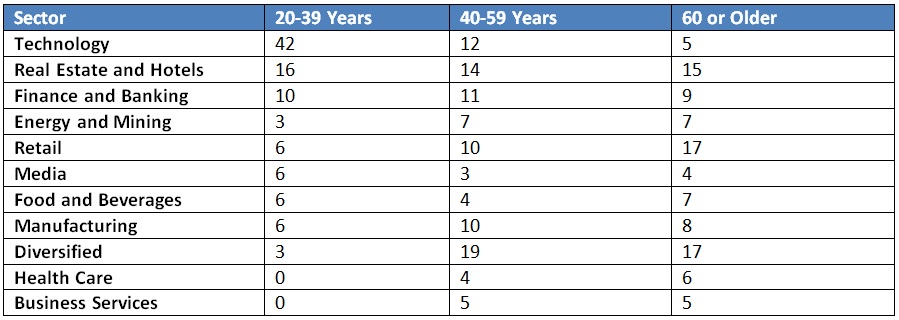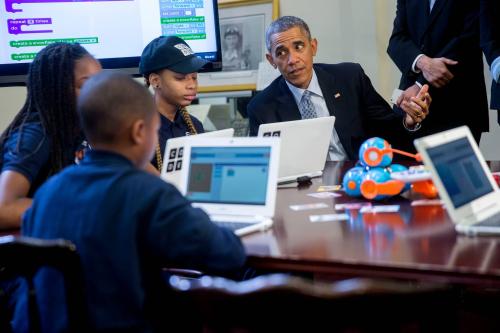“A tendency to disrupt the status quo is a trait shared by many billionaires,” writes Darrell West in his new book Billionaires: Reflections on the Upper Crust. The ability to solve problems in innovative ways enabled many billionaires to build their fortunes in the technology sector. In West’s expansive catalogue of the top billionaires’ impact on modern society, he highlights technology’s important role.
West notes that in recent decades, the lucrative technology sector has created numerous “technopreneurs” and has produced far more billionaires than other parts of the economy. “Younger billionaires are most likely to have earned their fortunes in high technology,” West observes.
Where Did Billionaires Make Their Fortunes?

* Percent of Billionaires Who Earned Their Fortune in Selected Business Sectors, by Age of Billionaire. Source: Billionaires, Darrell West (2014).
Rise of the Hoodie-Wearing Billionaire
Mark Zuckerberg, Facebook’s founder, is one of the most prominent young technology entrepreneurs. The popular social media website was created in 2004 while Zuckerberg was a student at Harvard. Embodying millennial values of social consciousness, he has joined the ranks of high dollar donors within the past few years. Recently, he gave $990 million to the Silicon Valley Community Foundations, and $100 million of that went to support education reform in Newark, New Jersey. Along with dipping his toes in philanthropy, Zuckerberg has dabbled in politics. He created www.fwd.us, a group that advocates for immigration reform. Partnering with other technology firms, Zuckerberg’s group broadcasts ads designed to encourage Republican legislators to support reform efforts. Zuckerberg has said of his political involvement, “the United States doesn’t have ‘enough talented people’ and needs immigrants to strengthen the knowledge economy.”
Disrupting Industry and Philanthropy
Technopreneur Jeff Bezos has made headlines, literally. In 2013, Bezos purchased The Washington Post for $250 million. Upon the acquisition, Bezos said, “journalism plays a critical role in a free society.” Bezos should know, since he got his start as an online bookseller. In 1994, he created Amazon based on the belief that consumers wanted a service that allowed them to shop for different products while at home. Bezos is also a major funder of space travel, which is now considered to be a private science due to “declining government support for the science.” Recently, Bezos has also become involved in politics. In 2012, he and his wife, MacKenzie, gave $2.5 million to support marriage equality in Washington state.
Arguably the most famous tech billionaire is Bill Gates, the founder of Microsoft. A Harvard dropout, Gates made his billions selling the Windows operating system and other software products. West remarks, “If Bill Gates were a country, he would be the sixty-fifth richest nation in the world. At an estimated $76 billion, his fortune is larger than the gross domestic product of countries such as Costa Rica, Lebanon, Tunisia, Uruguay, Slovenia, Kenya, Panama, and Bolivia.” As of March 2014, Gates is considered to be the wealthiest individual in the world, with a net worth of $77.8 billion.
Gates has also donated a historic amount of money to charity. Along with his wife, Melinda, he cofounded the Bill and Melinda Gates Foundation in 2000. The foundation has around $40 billion in assets and in recent years has provided annual grants totaling $3.4 billion. The Gates Foundation “pursue[s] research-driven, strategic, and measurable solution to global problems: eradicating diseases; enhancing the effectiveness of K-12 education; improving disadvantaged students’ access to and chances of success in obtaining higher education; and promoting economic development in underdeveloped nations (through investments in healthcare, education, nutrition, sanitation and agricultural productivity).” In 2013, Gates said his foundation had set the goal of eradicating polio in the subsequent five years and committed $1.8 billion toward a $5.5 billion project to exterminating the disease.
Billionaires is a tour de force which details the gargantuan impact this tiny slice of society has on the remaining 99.99998%. The findings Darrell West uncovers about the technology industry’s changing composition, potential for wealth and also potential for benefitting society are important to think about as new challenges and opportunities for this industry arise.
Emily Feldmesser contributed to this post.



Commentary
Technopreneurs: How Tech Innovations Have Created a New Generation of Billionaires
September 18, 2014